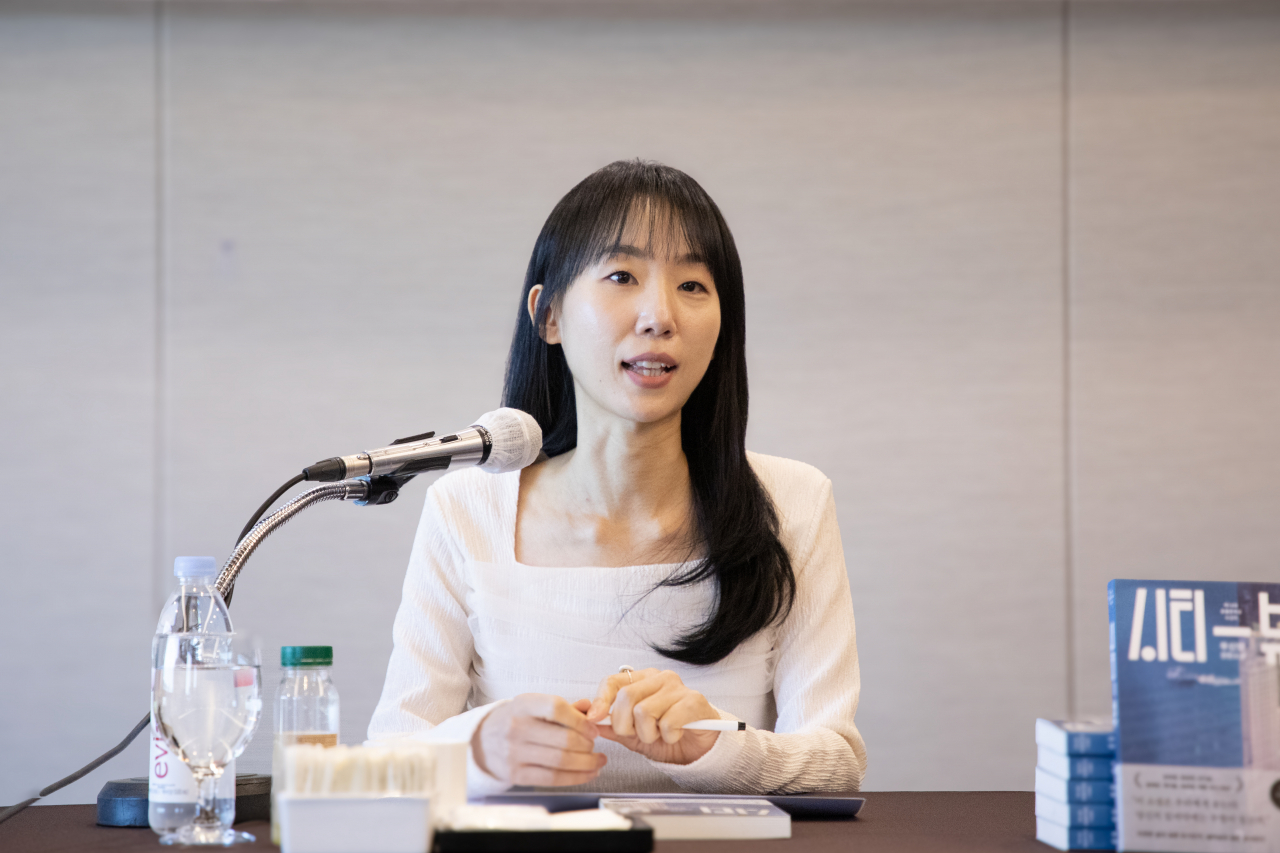
 > Life&Style > Books
> Life&Style > Books
 |
| Woo Shin-young speaks at a press conference in Seoul on Tuesday. (Dasan Books) |
Gazing at the gleaming glass facades of the skyscrapers in Songdo, Incheon, author Woo Sin-young wondered how they could remain so sleek and beautiful.
Then, she recalled reading news about workers who were injured or lost their lives while cleaning those windows.
“As I delved deeper into these articles, I felt that someone should speak out on their behalf and give a voice to their stories and narratives,” said Woo, a debut novelist whose "City View" recently won the 14th Honbul Literary Award, which recognizes full-length novels.
Woo, who previously lived and worked as a contemporary Korean literature professor in Songdo, drew inspiration from these stories for her novel, set against the backdrop of the planned high-tech city. In February, she resigned from her teaching position, dedicating the next few months to writing the novel.
"City View" explores the lives of various characters, centering on a middle-class couple -- Sumi, who runs a Pilates center, and her physician husband Seok-jin. On the surface, they maintain a polished life, but Sumi is secretly involved with her male fitness trainer, a relationship she considers nothing more than a "trivial immorality." When Yu-hwa, a factory worker from the city’s industrial outskirts, suddenly intrudes into the couple's life, secrets begin to unravel their seemingly perfect marriage.
“Woo presents a panoramic view of a ruthless city, where everyone is different on the inside yet universally afflicted by loneliness,” the award judges assessed. The novel captures the chilling struggles of modern urbanites who, despite suffering from obsessions, deficiencies, self-harm, industrial accidents and trauma, strive to maintain a facade of smooth and orderly existence. Woo, for example, juxtaposes the thrill of scaling artificial rock walls with the perilous situation of those risking their lives to clean skyscraper glass.
“When I was teaching students -- like about Cho Se-hui’s ‘The Dwarf,’ I felt somewhat ashamed. This work was born out of that guilt stemming from the self-consciousness of only having sat behind a desk. So it felt a bit complicated,” Woo said upon winning the award.
The seminal 1978 novel "The Dwarf" sheds light on the shadows of Korea’s industrialization and economic miracle, portraying the lives of poor city dwellers marginalized during the country's rapid industrialization in the 1970s.
"The two most important themes in contemporary literature are money and sex. And the very specific and intimate point where these two intersect is the human body,” Woo explained, referring to some of her classes. She described how the settings of her novel -- the Pilates studio and hospital -- are linked to the intersection of money and sex within the human body.
It is only the first year of Woo being a full-time writer, but she has already garnered several accolades, including the Honbul Literary Award. Woo’s children’s book, “The Always Warm Porridge House,” published last month, won the 30th Golden Goblin Award from BIR Publishing, while her other children’s fantasy book, “Alice Who Fell Into a Manhole,” won the first EZbook Genre Fiction Award earlier this year.
"I started with a humble desire to write my own stories, and I am grateful to those who have given me this opportunity. It has been a happy year, and I hope to offer a warmer perspective to many through my books, including children’s books and novels,” said Woo.
The Honbul Literary Award, established in honor of the literary spirit of Choi Myung-hee (1947-1998), author of the epic novel "Honbul," which follows three generations of women under Japanese rule in the 1930s, recognizes works of full-length fiction with no distinction between new and established authors. The award carries a cash prize of 70 million won ($52,700).








